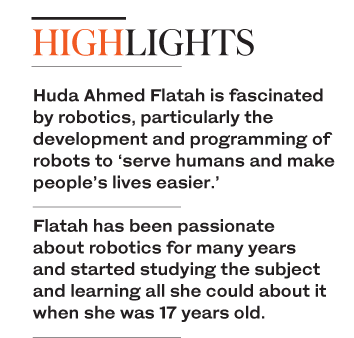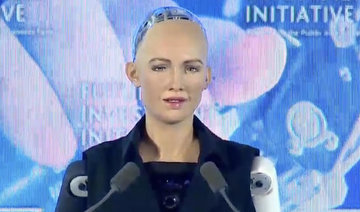RIYADH: It is often said that if you are determined enough, and doing something you are passionate about, you can achieve anything. It is tempting to be a cynic and dismiss this as a cliche pulled from a motivational speaker’s handbook. However, some people take the advice to heart and strive to achieve great things.
Take Huda Ahmed Flatah, a 22-year-old from Riyadh who recently graduated in biology at Taibah University in Madinah. Her irrepressible passion goes far beyond the subject she studied; she is fascinated by robotics. In particular, the development and programming of robots to, as she puts it, “serve humans and make people’s lives easier.”
Flatah is the founder of Robot Helper, an initiative to develop and program a robot that provides a tangible benefit to society.
“I programmed a robot to help visually impaired and blind people,” she said. “It acts like a companion to the blind and visually impaired. It guides the person to ensure the safety of people. For example: ‘Take care there is a stair in front of you.’ ‘There is a person coming, go right, go left.’ I am still working on it to add more services it can provide to help people with this type of disability.
“I wanted to help people achieve independence through robots. Based on that, I received a scholarship from the adviser of Makkah emir and KAUST general manager. I was chosen as one of the best 10 inventors with innovative projects this year in Saudi Arabia. Now, I am working on ways to enhance it and add more services so it can help people and the community.”
Flatah was also part of the Madinah team for the 2017 International Space Apps Challenge. The competition was held in Riyadh, Madinah, Jeddah and Eastern Province at the same time with live broadcasts from all the other countries participating.
This is NASA’s annual “hackathon” event, held in cities around the world, which challenges space and technology enthusiasts to use freely available scientific data to develop innovative, open-source resources that can improve the quality of life on Earth and advance space exploration.
“We were a team and they showed us some environmental problems and we tried to solve them,” said Flatah. “We chose the high temperatures in Saudi Arabia and wasted energy as a problem to solve.
“We created Save Solar System Smartly, which relies on two data-set resources: NASA’s prediction of the weather, and the sensors in smart homes. When the sun releases its energy, solar panels absorb this energy and save it in a smart battery to control devices in a smart home. When the battery is charged it deploys the Internet of Things (IOT) concept to manage everything in the house, including lighting, air-conditioning, opening and closing doors and windows, and so on.”
IOT refers to networks of devices, appliances and other items fitted with technology and connectivity that enables them to exchange data, which can help to increase efficiency, and running costs, among other benefits.
“If the battery gets low or is about to run out, the system’s artificial intelligence informs the IOT system to reduce the consumption of energy from it,” said Flatah.
For its efforts, the team was awarded first place among entrants from Saudi Arabia.
Flatah was also ranked the top robot programmer in Saudi Arabia in a national competition titled “ball collector robot game” in 2017.
Her ambition is to help create a culture that encourages innovation in robotics. She is presenting educational workshops at King Abdul Aziz & his Companions Foundation for Giftedness and Creativity on how to program a robot, to expand knowledge of the technology and its potential uses and benefits.
“I also teach in advanced schools and a number of local universities, and I have been a certified judge of robotics in the Middle East since 2017,” she added.
Flatah has been passionate about robotics for many years and started studying the subject when she was 17 years old. She has lived in Saudi Arabia her whole life but has traveled to other countries for training courses and to participate in competitions.
“For me, it was a big passion and dream that I did not expect to come true until I went to university,” she said. “I got to know a few students who had similar interests and we created an ‘invention and innovation’ club. I headed the club for a year and organized 12 events and competitions at a university level.
“I teamed up with the other girls and together we started intensive online studying. There was a great coach, Waleed Althobaiti, whose YouTube videos helped us out in a big way. We asked the university board to financially support us; they did and paid us nearly SR10,000 to encourage our learning process.”
Flatah and her colleagues continued researching the subject online and signed up for as many courses and workshops as they could, visiting several Arab countries in the process. There were a few problems and setbacks along the way, often related to obtaining equipment and supplies.
 “I struggled when my equipment and tools were burned, for example,” she said. “Deliveries would take weeks to arrive, sometimes months. Another difficulty was lack of funding. If the university did not agree to buy the requested supplies or equipment, we used to save money to get it. We were students — our families supported us. The same applied to our short trips for learning.
“I struggled when my equipment and tools were burned, for example,” she said. “Deliveries would take weeks to arrive, sometimes months. Another difficulty was lack of funding. If the university did not agree to buy the requested supplies or equipment, we used to save money to get it. We were students — our families supported us. The same applied to our short trips for learning.
“The university has helped us but one of the conditions was that we could only use the equipment or tools on campus and for competitions. However, we had to get our own stuff so that we could learn and practice at home, or meet to finish a project.”
Another annoyance was the occasional disparaging or negative comments from some people about her work. However, Flatah used this as motivation to learn more and work even harder.
“They are my biggest inspiration,” she said. “The supporters and the negative people: Both inspire me and push me to become the person I want to be. However, I will never forget how my family, friends and university professors supported me.”
Flatah’s dream now is to continue her studies overseas, she said, adding: “I am aiming to get a scholarship either in Japan or the UK. I even applied to more universities, institutions and centers in many other countries, so I can learn and discover this huge innovative world.”
Since graduating last Ramadan, Flatah has been dividing her time between working in a hospital as a phlebotomist and continuing her academic journey.
“I also connected with authorities that can support me with my new invention, such as Dulani Business Center,” she said. The center provides non-financial support to small and medium-sized businesses, including training, counseling, consulting and networking.
Flatah believes this is the dawn of a golden age for Saudi women thanks to the ongoing social reforms.
“It is an unmatched opportunity for us to become independent, for me to build myself up and make a name for myself without thinking that it is a dream for me as a Saudi woman to achieve it,” she said. “Now the dream can be considered a realistic goal.”
The key, she added, is to grasp the opportunity: “There is nothing more beautiful than living with a purpose, something that can make you alive and happy with each step you take through life. I dream of programming robots to do more services to help humans.”















